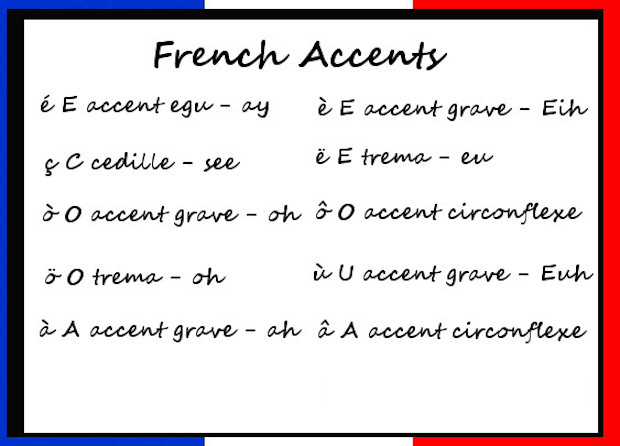Accents are essential to correctly using the French language, but for those of us who aren’t familiar to writing with accents, they can be very tricky indeed.
In French, the pronunciation and meaning of a word can change with or without an accent. Sometimes, accents aren’t included when the French type online, but that’s another story. In regular writing, it’s important to use accents correctly.
The French language uses five different kinds of accents. They are as follows:

- l’accent aigu (the acute accent, literally the “high” accent). This accent is only used as: é
- l’accent grave (the grave accent, literally the “low” accent). The grave accent can be used with the following three letters: à, è, ù
- l’accent circonflexe (the circumflex). This accent can be used with the following letters: â, ê, î, ô, û
- le tréma (the umlaut). This accent can be used with ë, ï, ü
- la cédille (the cedilla). This accent is only used as: ç
The accent aigu is the most common accent used in French because it is used for the past tense form of many verbs. This makes the “e” sound higher–think of your voice following the accent up from the left to the right–é. For example the past participle of the verb donner (to give) is donné. The accent aigu on the last letter here makes it sound just like the infinitive verb form (don-ay).
With the letter “e,” the accent grave is the opposite of the accent aigu. Picture your voice going lower by following the accent from left to right–è. It is used for the pronunciation of the letter “e,” but with the letters “a” and “u” the pronunciation does not change and it is only used to distinguish one word from another. For example, ou means “or” but où means “where.” These two words are pronounced exactly the same.
La cédille is used to make a hard “c” sound softer. In fact, the ç sounds exactly like the English “s.” For example, façade is pronounced with a soft c or s sound.
The trema is used only when two vowels are next to each other and both need to be pronounced. Think of the two dots of the trema as both vowels next to one another. Thus, mäis is pronounced mah-ez.
If you know the use of these accents, you can spell any word that you hear correctly (accents and all!) based on its pronunciation.
Blog submitted by: David at The French Property Network - Cle France.
This blog was originally posted on The French Language Blog pages.










